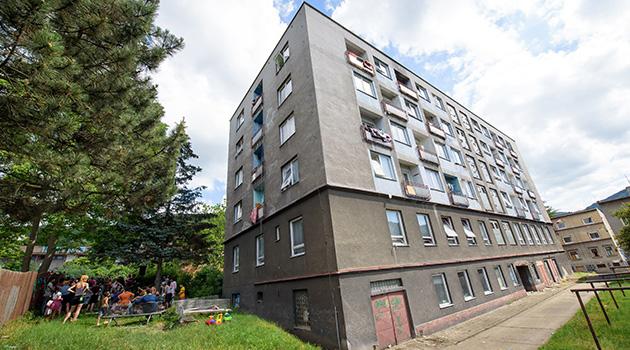Czech Govt Agency for Social Inclusion: 80 % of families who left residential hotels for standard rentals still renting one year later

More than four-fifths of households living in residential hotels who were able to apply for extraordinary benefits to cover the costs of deposits and equipment when moving into standard rental apartment units are still in that housing in good standing one year later. Almost one-fifth of such households, moreover, made the move without requesting housing benefits from the state at all.
The Czech Government Agency for Social Inclusion’s has released its findings of research into the issue. The Agency assessed the effectiveness of the 768 extraordinary benefits provided to people from the beginning of 2016 until May 2017 by the Labor Office so they could move out of inappropriate housing conditions and obtain standard rental units.
“The benefit for extraordinary immediate aid is an effective instrument for addressing the housing shortage. Overcoming the financial barriers to accessing standard rental housing assists the vast majority of such households with moving away from substandard accommodations,” Agency expert Roman Matoušek said.
According to Agency experts, people in financial need do not have the resources for the higher expenditures associated with establishing a new lease. They are therefore unable to afford to pay deposits for rental housing.
Extraordinary immediate aid can be taken advantage of, as the Czech state provides this in exceptional situations ranging from assisting flood victims to helping parents afford their children’s school supplies. To lease a standard apartment unit it is possible to receive the equivalent of two months’ rent at the most, which is anywhere between CZK 10 000 and CZK 20 000 [EUR 400 – EUR 800], Matoušek clarified.
The expert said local Labor Offices assess applications for such benefits on a case-by-case basis. When assessing the effectiveness of the aid, what is followed is whether the people have been able to stay in the housing one year later.
If more than 80 % of such households or individuals manage to remain tenants in good standing after that amount of time, the project is considered successful. Of the 768 recipients tracked by the Agency, 83 % met that standard.
A total of 18 % of those tracked also did not subsequently apply for any other housing benefits in order to maintain their standing. Two-fifths of those tracked were living in the units thanks to housing subsidies, while one-fourth maintained their standing thanks to housing supplements.
One year after the provision of the extraordinary benefits, 17 % of those tracked were once again living in inappropriate, insecure accommodation such as residential hotels or shelters. According to the Czech Government Strategy for Combating Social Exclusion, the extraordinary immediate aid benefits began being used to cover deposits in 2015.
The plan of measures for the Strategy counted on assessing the effectiveness of this particular budget contribution. According to that document, the target is to move 6 000 households out of residential hotels or other substandard housing and into regular rentals by the end of 2020.
“Addressing the rental shortage is one of the prerequisites for ending the inter-generational transfer of poverty from parents to their children. It has been demonstrated through research, both abroad and here in our country, that inappropriate housing in particular deteriorates children’s school achievement, leads to their leaving education, limits their employment and income prospects, and leads to their being unemployed as adults,” Matoušek said.
The current Government pledged in its program declaration to design a social housing law. In its chapter on housing policy, the program declaration says such legislation will address the needs of people who are destitute and marginalized, create conditions for municipalities to address the issue, and that social workers will work with social apartment unit tenants.
One month ago, Czech Prime Minister Andrej Babiš (ANO) said a stand-alone law would probably not be drafted on the issue and that the Government would concentrate on a program to build more apartment units. Czech Labor and Social Affairs Minister Jana Maláčová (Czech Social Democratic Party – ČSSD) then informed the public of 15 measures related to the issue, such as regulating the number of persons allowed to reside within the spatial dimensions of real estate properties approved for habitation or the maximum rents that can be charged for such properties.
Czech politicians have mainly been discussing how to proceed against “trafficking in poverty and the scumbags” who charge exorbitant rents to impoverished tenants in order to tap the state benefits available to them. According to experts on social issues, however, it is first necessary to create a secure housing system so people will have somewhere else to move into when they decided to leave unsatisfactory areas.
